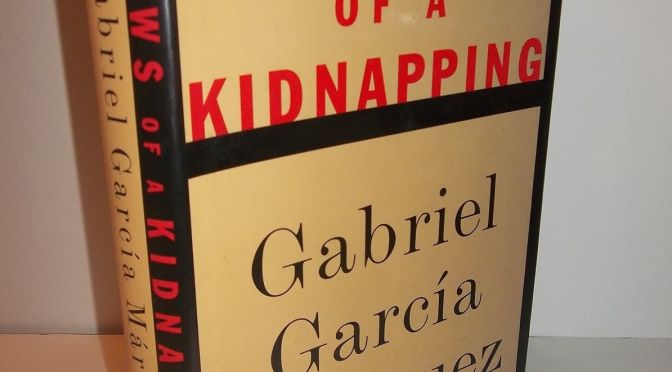A few years ago, I picked up a copy of the Gabriel Garcia Marquez book — News of a Kidnapping (happened to be a first translated edition — no author signature). A few weeks ago, before I learned of the elections in Colombia, I started reading it. When I purchased this book, I assumed it was another fiction novel, hopefully full of magic realism. But even better than that — and coincidentally — it is about a relevant and real topic: the kidnapping of a number journalists in Colombia during a time in which various factions were at war. Technically they still are, and a couple of weeks ago, the citizens of Columbia voted down the peace treaty — which went to a vote of the people — for a number of reasons. Since then, however, the ceasefire is holding, and more talks are at hand. This week, Colombia’s president, Juan Manuel Santos, won the Nobel Peace Prize; Garcia Marquez won the Nobel Prize for Literature in 1982. Given all that, not only does this book read like a political thriller, it is also completely relevant (sadly) even though it was published in 1996.
One (translated) quote from the book that Americans should think about, I believe, is:
Easy money, a narcotic more harmful than the ill named ‘heroic-drugs’ was injected into the national culture. The idea prospered: The law is the greatest obstacle to happiness; it is a waste of time learning to read and write; you can live a better, more secure life as a criminal than as a law-abiding citizen–in short, this was the social breakdown typical of all undeclared wars. (130)
This is a lot of verbiage about a good book by a great writer, but the point of this post is that I am READING it. I’m reading it in all of its dust-jacketed, first edition perfection. And I put it in my purse and read it in the car while I was waiting for my daughter. And I feel guilty.
Because somehow, first editions are for collecting, and it’s wrong to mess up something that’s collectible. Collectible books are precious gems to hold onto and take out of their cases very careful. Perhaps turn a page or two, but be very careful not to bend the binding or a corner.
But, then again, the other part of me says, “What good is a book if it’s not read?” Putting a book on a shelf to stay pristine so it remains collectible is antithetical to the idea of writing and repudiates the world of ideas through a willful act of neglect. Reading and writing are a transaction not in the sense that one makes a deposit in a bank and then takes out the thing when it’s useful monetarily. They are a transaction between the self and the world of ideas, of history, of morals, and of art. And that just begins to touch on it. To leave a book on a shelf is to leave ideas unshared, thoughts not thought, connections not made, souls not touched.
I may no longer be able to sell this copy on Abe Books or some other marketplace for top dollar because of the slightly bent dust jacket, but I’ve learned and connected more with the world around me. And that’s worth more than what anyone might pay me for that pristine copy.
